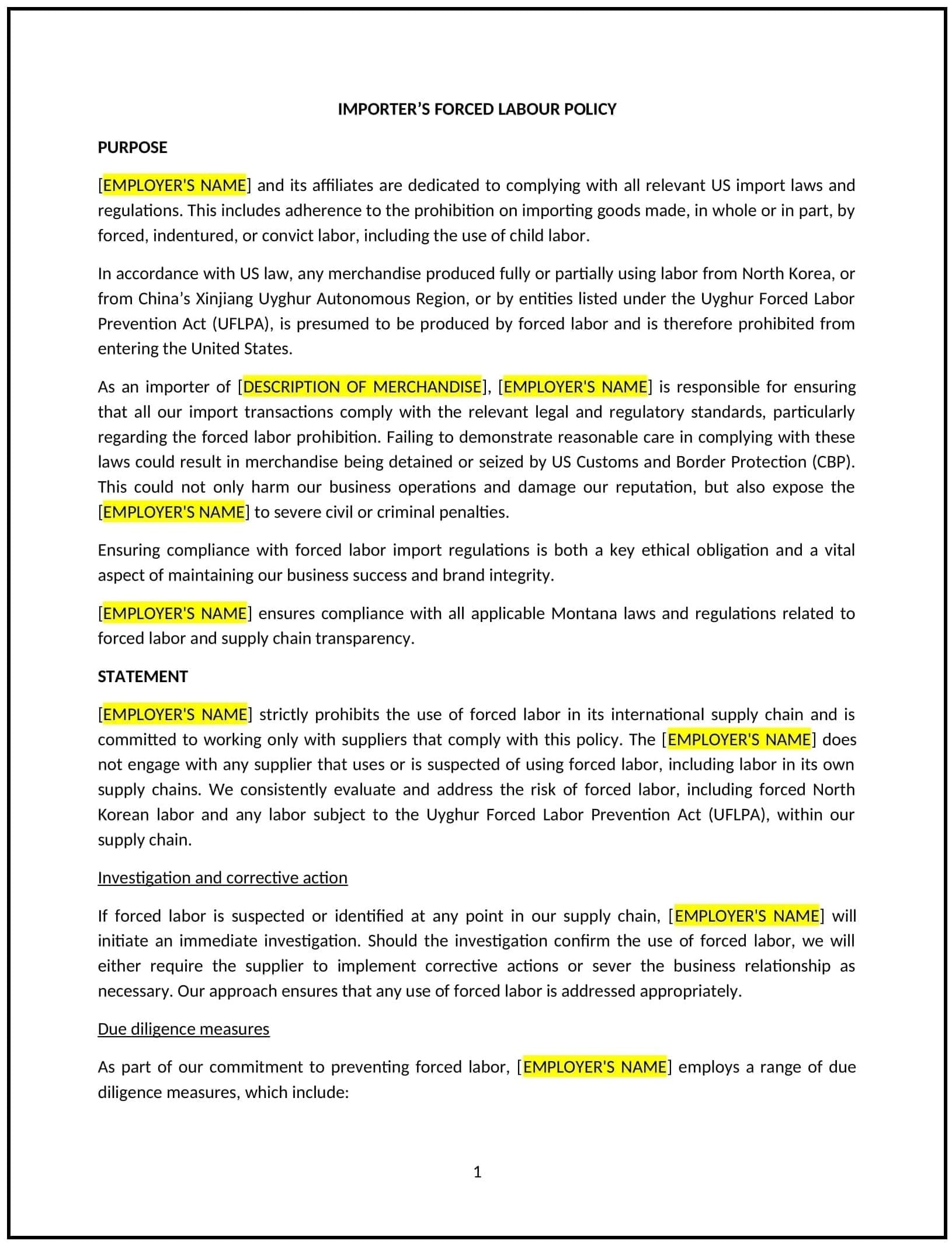Importer's forced labour policy (Montana): Free template
Got contracts to review? While you're here for policies, let Cobrief make contract review effortless—start your free review now.

Customize this template for free
Importer's forced labour policy (Montana)
An importer's forced labour policy helps Montana businesses combat forced labour in their supply chains, ensuring that they do not engage with suppliers who use exploitative or unlawful labor practices. This policy outlines the company's commitment to identifying and eliminating forced labour, trafficking, and other forms of modern slavery from their operations and supply chains.
By implementing this policy, businesses can protect their reputation, support ethical sourcing practices, and ensure that they are operating in line with legal and ethical standards.
How to use this importer's forced labour policy (Montana)
- Define what constitutes forced labour: The policy should outline what qualifies as forced labour, including situations where workers are coerced, threatened, or deceived into working under exploitative conditions, as well as any practices related to trafficking or bonded labour.
- Establish supply chain monitoring: Businesses should outline the procedures for assessing and monitoring suppliers to ensure they are not involved in forced labour. This may include regular audits, inspections, or supplier certifications related to labour standards.
- Set due diligence procedures: The policy should specify how businesses will conduct due diligence on their suppliers, including background checks, interviews with workers, and reviewing supplier practices for indicators of forced labour.
- Outline reporting mechanisms: The policy should create a clear and confidential process for employees, suppliers, or other stakeholders to report concerns related to forced labour, trafficking, or other human rights violations within the supply chain.
- Provide corrective action procedures: The policy should establish steps to be taken if forced labour is detected in the supply chain, such as working with suppliers to rectify the issue, providing training to workers, or severing relationships with non-compliant suppliers.
- Promote employee and supplier training: The policy should include provisions for training employees and suppliers on recognizing forced labour practices, human trafficking, and the importance of ethical sourcing.
- Review and update regularly: The policy should be reviewed periodically to ensure it stays relevant to current laws, industry standards, and emerging risks, with updates made as necessary to address new challenges.
Benefits of using this importer's forced labour policy (Montana)
This policy provides several key benefits for Montana businesses:
- Protects the business's reputation: By committing to ethical labour practices, businesses can avoid involvement in human rights abuses, reducing the risk of reputational damage and negative media coverage.
- Promotes ethical sourcing: The policy encourages businesses to build strong, responsible supply chains, supporting the use of fair and legal labour practices across the industry.
- Enhances legal compliance: By addressing forced labour, the business ensures compliance with federal and international laws, avoiding legal penalties or sanctions.
- Improves stakeholder trust: Companies that demonstrate a commitment to eradicating forced labour can strengthen trust with customers, investors, and employees who value ethical business practices.
- Reduces supply chain risks: Monitoring suppliers for forced labour reduces the risk of working with partners who may engage in illegal or unethical practices, mitigating financial and operational risks associated with human trafficking and exploitation.
- Supports sustainable growth: A commitment to ethical practices in the supply chain ensures long-term stability and sustainability, building a foundation of trust and compliance that supports future growth.
Tips for using this importer's forced labour policy (Montana)
- Communicate the policy clearly: Ensure that all employees, suppliers, and stakeholders are aware of the policy and understand their responsibilities regarding forced labour and ethical sourcing practices.
- Conduct regular audits: Regularly audit suppliers to monitor for any potential forced labour practices and ensure that corrective actions are implemented as needed.
- Engage with suppliers: Work closely with suppliers to ensure they understand and comply with the forced labour policy, providing guidance, training, and support as necessary.
- Train employees on the issue: Offer training to employees, especially those involved in procurement, supply chain management, and auditing, to help them recognize signs of forced labour and human trafficking.
- Set clear expectations for suppliers: Establish clear contractual obligations and expectations regarding labour practices, ensuring that suppliers understand the consequences of failing to adhere to ethical labour standards.
- Continuously evaluate and improve the policy: Regularly review and update the policy based on emerging best practices, changes in laws, and feedback from employees and suppliers to ensure it remains effective in addressing forced labour risks.